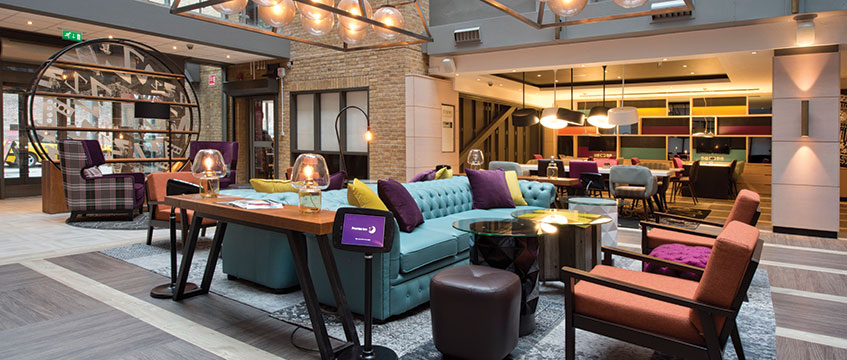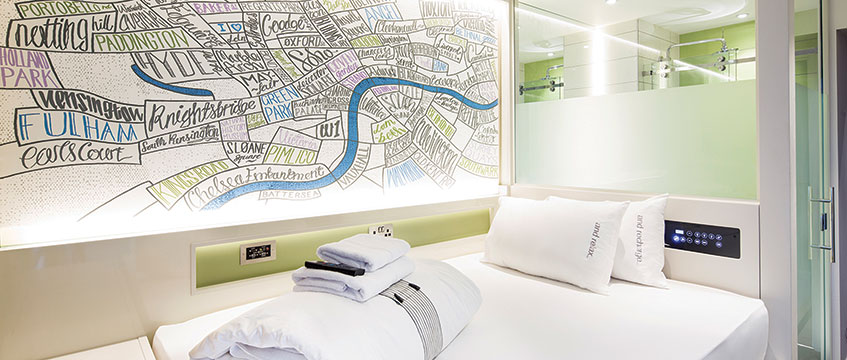Since Whitbread spun off its Costa Coffee chain in a £3.9bn sale to Coca-Cola Holdings, the Premier Inn parent has begun life anew as a hotels-focused company.
The sale, which completed in January, had been brewing since early 2018 and followed pressure from activist hedge funds Elliott Advisors and Sachem Head.
However, Whitbread maintains that breaking up the business was something it had always intended to do.
Mark Anderson, the company’s managing director of property and international, says the de-merger was always the plan, once Costa reached a size where it was “big enough to stand on its own two feet”.
“It was in a very different market,” says Anderson, highlighting the differences between the asset-light, high-returning and fast-moving retail business with the more capital-intensive and comparatively lower-returning nature of UK hotels.
Now Whitbread has set out its stall as a hotels specialist, the property team’s freehold and leasehold strategy will be crucial in underpinning both Premier Inn’s expansion and the wider company’s financial position.
But how is the team finding it, working with notoriously punchy activist investors?
While chief executive Alison Brittain and chairman Adam Crozier are usually the people who directly interact with the company’s shareholders, the property team was nonetheless fully prepared for the question.
Alex Flach, UK development director, even whips out a sheet of paper containing a prepared statement.
“The official line: we’ve had overwhelming support for our vertically integrated model and flexible approach to property from all our shareholders,” he reads out. “So there we go.”
Anderson adds: “I presume [Elliott Advisors and Sachem Head] have done very well from their investment over the past 12 months. I think if they want to carry on being a shareholder they’ll do pretty well in the future.”
A ‘tough’ year ahead
While Whitbread predicted in January that it would meet profit expectations in its 2019 financial year, it warned that underlying profit would be flat the following year.
This is because revenue per available room (revPAR) in the UK market is widely forecast to weaken, especially in the regions.
Profits will also be hit as Whitbread plans to use capex to add a further 3,000-4,000 bedrooms a year to its growing portfolio.
The expansion of 2,500 bedrooms in Germany will likely lead to a loss of around £12m in 2020, but Whitbread expects to be back in the black by its 2022 financial year.
- Premier Inn’s UK presence: 74,508 bedrooms in nearly 800 hotels
- Target UK size: 110,000 bedrooms
- Premier Inn’s Germany pipeline: 6,430 bedrooms across 35 hotels
- Property portfolio value: £4.9bn to £5.8bn, based on a yield of 4.5-5%
- Freeholds: 63% of estate
- Leaseholds: 37% of estate
- Hotel concepts: Premier Inn, Hub by Premier Inn, Zip by Premier Inn
- Pub and restaurant brands: Brewer’s Fayre, Beefeater, Cookhouse & Pub, Bar + Block, Thyme, Table Table
Expansion will take precedence until it reaches its 110,000-room target in the UK, where it currently operates 74,508 across nearly 800 hotels.
Its extensive list of target locations covers the whole of the UK. Following a management restructuring, the property aspects of this will be overseen by Flach, whose role combines construction with acquisitions. Simon Hobbs will be tasked with the existing estate and its asset management.
Cashing in from Costa
Given that the property strategy sits at the core of the hospitality group’s growth trajectory, Anderson’s team likely faces some pressure to devise solutions that create value for shareholders.
In its capital markets presentation to investors in February, the company said 10-15% of its estate had the potential to be sold and leased back, subject to capital structure and funding conditions.
And with its portfolio valued at £4.9bn to £5.8bn, potential freehold sales could generate around £870m.
However, Flach and Anderson downplay the notion of a more far-reaching sale-and-leaseback programme to fund its capital requirements.
Of the £3.9bn in proceeds from the Costa sale, at least £2.5bn will be returned to shareholders, subject to other “value-creating” initiatives, meaning there is no immediate need to resort to such measures.
“We [are sitting] on a large freehold estate – we can use that as a source of funding if we need to in the future,” says Anderson.
“But in the year ahead we are just keeping it tight, keeping control, restricting the rent going through the P&L, and giving the shareholders back the money from Costa.
“Once we’ve done that, we will have that flexibility.”
Flach adds: “Sale and leasebacks are something we have done a reasonable amount of over the past few years.
“We will probably do a bit less of that, certainly in the short term. The money from Costa has meant we don’t have a need to.”
Equally, separating the opco from the propco – historically popular among hotel companies for servicing debt and for potential tax efficiencies – is “not on the table”.
“As a business, we will not split it [off],” Flach asserts.
Zipping past the competition
Traditionally, Premier Inn draws in the business-to-business crowd. During the course of a week, more than 70% of its customers – roughly 80% of revenue – are short-stay business travellers.
In a bid to appeal to new consumer types, primarily value-seekers, Premier Inn has launched lower-cost offering Zip, which halves the standard Premier Inn room size to 91.5 sq ft.
In February it launched a 138-bedroom pilot hotel at a former Premier Inn in Cardiff and if Whitbread decides it is on to a winner, the compact hotel concept will launch in freehold assets on the outskirts of major towns and cities around the UK. Beyond that, finding sites will, as ever, be the main challenge to expansion.
Having a freehold estate [to] back up a leasehold estate means you can ride the economic downtimes
Flach says: “It can be a big growth area if we can get it, and the financial model, right.
“When you open the first one, you throw everything into it – see what the guests like, refine it and then decide how to roll it out. We have another six to eight in the pipeline coming through, so it is early days.”
Meanwhile, Hub, its design-focused hotel concept, is currently operating in London and Edinburgh with around 15 more locations in the pipeline.
Manchester, Birmingham, Cambridge, Oxford and Brighton are among the key cities it is aiming to expand to.
Schlaf gut
Premier Inn has also outlined Germany as a primary growth target, where its fragmented budget hotel market promises plenty of opportunity for expansion.
The company, which currently has two hotels in Germany, aims to run at least 20 in the country by 2020.
As a market performing some 15 to 20 years behind the UK – not least because the majority of its stock is owned by independent hoteliers – the aim is to recreate its track record in the UK.
“In Germany there are still a lot of markets where they are dominated by independent hoteliers, and that’s easier for branded [firms] to take a share from,” explains Anderson, who is leading Whitbread’s overseas expansion strategy.
“It is also a really well-balanced market. In Germany you have about 15 cities that are all large, because it’s come out of the federal state structure. So Munich, Hamburg, Berlin, Düsseldorf, Frankfurt and Cologne are all big markets.”
Avoiding management agreements
In contrast to its asset-light rivals such as Holiday Inn, Marriott and Accor, which scale up internationally by working with local partners through management agreements, Whitbread is sticking to its freehold and leasehold model.
“If you look at the people who prefer hotel management agreements, they are typically global players who are expanding in lots of territories at the same time. And it is just not possible to do through equity; it is just too capital intensive,” says Anderson.
“Given Whitbread’s balance sheet, it is possible for us to double-run capital in two markets (the UK and Ireland, and Germany).
“We would have to do a different model if we were in, say, 15. But there would be a lot of drawbacks to it.
“You are always at the behest of the franchisees, and it can be a difficult relationship. Typically the high-net-worth individuals are hard to work with.
“So we like to own the brand and run it ourselves [and therefore the] property and the relationship with the customers. It gives us good-quality returns.”
At the moment 63% of the portfolio is freehold, while the remainder is leased.
Flach says: “In the hotels cycle in particular, not having a massive rent roll is a huge benefit. Some of our opposition have struggled financially because their rent rolls overtake profits in the downturn and then you are in trouble.
“But having a freehold estate [to] back up a leasehold estate means you can ride the economic downtimes.
“For us, every year around a quarter of our new openings come from extensions of our own sites – and it is so much easier to extend your own freehold site than to extend a leasehold estate. It is secure growth.”

To determine where to acquire and develop sites, as well as which hotels to exit or extend, Whitbread has forecast the maturity profiles of its sites and formulated a blueprint for every catchment.
Flach estimates that it operates in around 220 catchments in the UK, which are regularly analysed by its in-house commercial team.
To aid its strategy, the team also runs what it claims is one of the largest consumer research surveys in Europe. At its capital markets presentation in February, the company said it collected just under 10,000 consumer responses in 2018.
Saving the high street
Whitbread often converts sites into developments with mixed uses, which occasionally include offices and residential.
Increasingly, redundant retail park and high street spaces have formed a key focus for potential development sites. On the high street, the team is in talks with large retailers looking to offload space on upper floors.
The company’s stable of restaurant and pub brands, which include Beefeater, Brewer’s Fayre and Bar + Block, also provide the scope to occupy unused ground-floor space.
“Hotels such as Premier Inn, Hub and, potentially, Zip could be part of the solution to [regenerating] high streets and slimming retail locations, where it can offer regeneration and reformat what is there,” says Anderson.
The power of reinvention
It remains to be seen whether Whitbread’s strategy to become the world’s best budget hotel chain will be hardy enough to defy investor pressure and any potential takeover attempts.
However, it is worth noting that in its 277-year existence – and as one of the oldest names on the FTSE 100 – the company has proven itself to be highly adaptable.
After all, it was a beer-brewing business before it diversified into food and beverage in 1974, when it opened its first Beefeater restaurant.
And despite more than a decade of speculation in which Whitbread has been considered as a takeover target from hotel rivals and private equity firms alike, the company has doggedly stayed independent.
With property acquisitions and disposals at the heart of Whitbread’s strategy for growth, all eyes are on whether Anderson’s strategy will prove to generate enough value to appease its shareholders.
To send feedback, e-mail pui-guan.man@egi.co.uk or tweet @PuiGuanM or @estatesgazette










